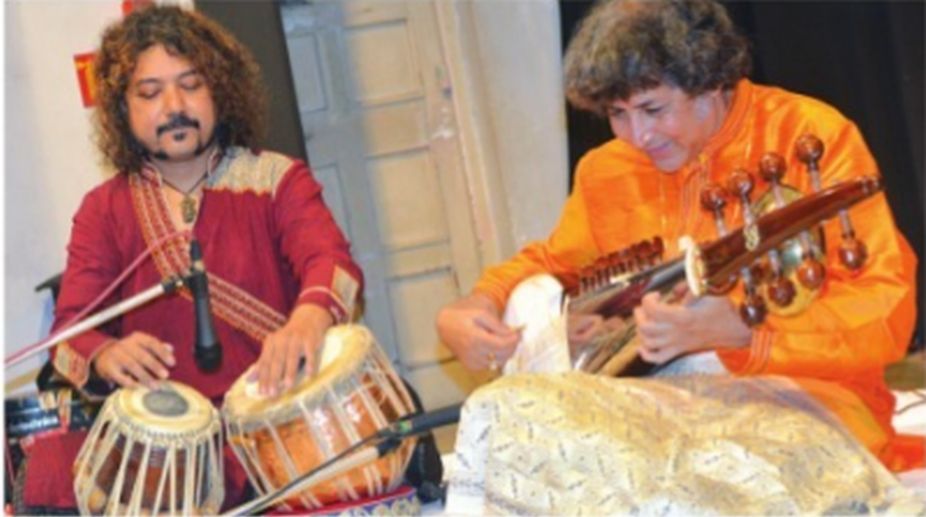To commemorate the birthdays of Pandit Ravishankar (7 April) and Ustad Ali Akbar Khan (14 April), Subhas Sanskriti Sangeet Parishad organised a judiciously conceptualised musical at the Calcutta School of Music. On the occasion, veteran sitar maestro Jaya Biswas shared her cherished memories of those days when she began learning from her extremely busy, glob-trotting Guruji, who, at that point of time was averse to teaching girls but finally accepted her as his disciple. “My sitar legend Guruji always sang to teach! In 1964, he laid the foundation of the Indian music section of the Calcutta School of Music”, said the former head of the same.
Earlier, well-known sarod exponent Parthosarothy, a disciple of Pandit Ravishankar, played an elaborate alap-jod-jhala in Gaurimanjari, a raga invented by Ustad Ali Akbar Khan, and in this way, united the two colossi belonging to the Maihar gharana. Also, the raga on display had traces of such beautiful melodies like Gauri, Puria Dhanashree, Poorvi et al — having both rishabhs, both madhyams, both dhaivats and both nishads. Despite having 11 notes, the chromatic phrases had no place in the format of the raga. Instead, different phrases displayed different placements of the notes — as is the basic stricture of Hindustani melodies.
Advertisement
However, for the gatkari, he chose his Guruji’s invented raga Charukauns. A brief aochar led to a beautiful teental gat-bandish that heralded rhythm-play copiously relished by both Parthosarothy’s sarod and his companion Shubhajyoti Guha’s tabla during bolkari-based taans, saath-sangat and jawabi-sangat and finally in high-speed jhala. An emotive Kafi dadara completed the recital.
As the final artiste, vocalist Vidushi Mandira Lahiri began with a Matrivandana, composed by the late sarangi wizard Pandit Ramesh Mishra, who chose raga Parameshwari from the group of Ishwari ragas, invented by Pandit Ravishankar. She followed it up with vilambit ektal and drut teental khayals in raga Shyam Kalyan. She was ably assisted by Ashoke Mukherjee (tabla) and Hiranmay Mitra (harmonium).
Melodious Book
Ustad Amir Khan: Pioneer of Indore Gharana was the cynosure of a unique evening organised as “Raga Rasa Sahitya” by Bharatiya Bhasha Parishad, in association with Thema Books at Parishad Sabhagar. This English translation of the original Hindi book, Sangeet ke Dedeepyaman Surya Ustad Amir Khan authored by Pandit Tejpal Singh (elder of the famous Singh-bandhus and disciple of the legendary vocalist) follows a Bengali version by the same translator. Both versions, replete with facts related to Khan saheb’s life and his compositions, are published by Thema books.
The English version was formally released by Pandit Vijay Kichlu. A delightful speaker, he from his treasure trove shared a few gems related to the Ustad’s immortal music, professor-like looks, grave persona and wry humour. He appreciated the sincere efforts of the trilingual translator who, since 2014, is also assisting him as a researcher and script writer to complete a prestigious project of Prasar Bharati — a TV serial having 52-episodes on Hindustani classical music.
As promised by Raga Rasa Sahitya, the book-release flowered into a melodious bouquet when Mumbai-based eminent vocalist Chandranath Chatterjee took the stage with his accompanists Surojit Saha and Pradip Palit on the tabla and harmonium respectively. Having trained with Pandit Amarnath, prime disciple of Ustad Amir Khan, Chatterjee chose to sing a few of Khan saheb’s favourite khayal and tarana compositions along with some of his popular numbers from films that include a thumri as well. A ghazal, sung by Khan saheb, under the direction of his devoted disciple and prolific composer Amarnath, for a documentary on Mirza Ghalib, was the final offering of the evening. All this was stringed with an analysis of Khan saheb’s unique gayaki, based on historical and social facts and anecdotes by yours truly, the translator of this book.
Actor Shahbaaz Khan, the younger son of Khan saheb, also joined in the celebration. “I was only eight, was in a boarding school in Maharashtra when my father died in a car accident here in Kolkata. I was too young to know who he was but my mother knew. And, probably, that is why she did not want me to be a vocalist. Now I have begun to understand that the responsibilities of a legend’s son are far too many than the privileges,” said Khan in his famous baritone, his eyes betraying pain.











